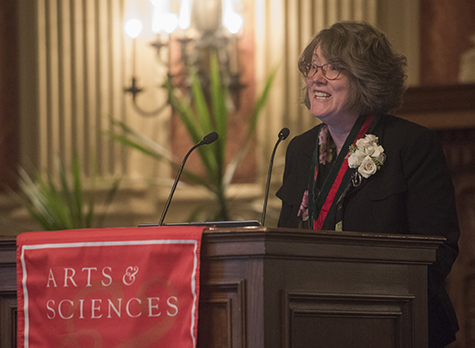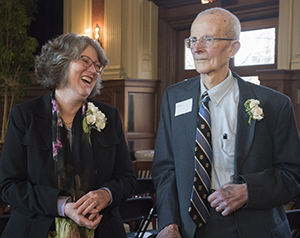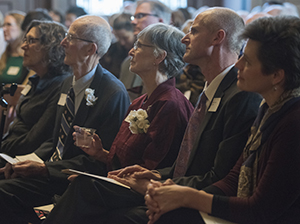
Fiona Marshall, PhD, an archaeologist in the Department of Anthropology in Arts & Sciences at Washington University in St. Louis specializing in the study of early food production in Africa and in animal domestication, was installed as the inaugural James W. and Jean L. Davis Professor. The ceremony was held Feb. 10 in Holmes Lounge.
The professorship is named in tribute to the lifelong contributions of the Davises to Washington University. Jim Davis taught and served in the administration for nearly five decades; Jean Davis has been actively involved in organizations serving the university.
“With this designation, I am proud to honor three individuals who represent the best of what Washington University offers,” Chancellor Mark S. Wrighton said. “Fiona Marshall, and Jean and Jim Davis, embody the teaching, research and service mission of the university and have made our institution the better for it.”
“Fiona is an exemplary scholar at Washington University,” said Barbara Schaal, PhD, dean of the Faculty of Arts & Sciences and the Mary-Dell Chilton Distinguished Professor. “Her research is groundbreaking and she continues to inspire students with her passion.”
Fiona Marshall
Born and raised in Nairobi, Kenya, Marshall’s work always has focused on African archaeology. Originally interested in early hominid archaeology, she switched her focus to the origins of African agriculture.
In the early 1980s, Marshall and her colleagues excavated a site in Kenya that is part of a savanna ecosystem with the largest animal biomass known to the world. To their surprise, most of the bones they found were of domestic animals, not wild animals. The discovery set her on a course to study animal domestication, such as a study she did on cat domestication in 2013.

Marshall’s use of zooarchaeological and ethnoarchaeological techniques to understand the relationships between early food production, climatic shifts and the spread of early herders in Africa has advanced the field of study and has positioned her as an international expert on the human influences on African savannas and on animal domestication.
Current research projects include the study of human-animal relations, complex interactions among ancient agricultural, pastoral and hunter-gatherer societies in Africa, the history and resilience of livestock and herding ways of life, and the sustainability of African grasslands.
Marshall’s teaching, both at the graduate and undergraduate level, focuses on providing deep time perspectives on contemporary issues. She trains students in the identification of animal bones and human-animal relations through time in both her classes and in her laboratory, which works in close collaboration with the university’s paleoethnobotany lab; the Department of Art History and Archaeology in Arts & Sciences; the International Center for Advanced Renewable Energy and Sustainability (I-CARES); and with the Saint Louis Zoo.
After earning her doctorate in 1987, Marshall joined the anthropology department as an assistant professor, and was promoted to full professor in 2002. Her administrative contributions include directing graduate studies for the department, a position she previously held for several years and currently holds; and serving as interim chair, once in 2006 and most recently during the 2013-14 academic year.
Professional honors include membership in the American Association for the Advancement of Science, and, at the university level, Marshall has twice received the Outstanding Faculty Mentor Award from students in the Graduate School of Arts & Sciences.
James and Jean Davis
After teaching in the Department of Political Science in Arts & Sciences for 43 years, James Davis, PhD, now enjoys the status of professor emeritus of political science.

He has made a lasting impact on two generations of students, in addition to major contributions to the study of American politics and to the entire university through the many administrative hats he has worn and the numerous alumni events and programs he has led.
“Jim Davis is the quintessential good citizen of this university,” Wrighton said. “Few people have served Washington University in as many important ways as Jim has.”
He came to Washington University in 1968 from the University of Wisconsin-Madison after earning a master’s degree in public administration and a doctoral degree in political science from the University of Michigan.
It was at Michigan where he met Jean Ludwig, and the couple has been married for 52 years. While at Michigan, Jean earned a bachelor’s degree, and she also earned a master’s in library science at the University of Wisconsin.
Jim Davis’ research, teaching and scholarship relates to American politics. More specifically, his work has concentrated on the U.S. presidency, campaigns, military history and the politics of war, and also covers national defense, intelligence and security issues.
He has authored several important contributions to his field, among them: “The National Executive Branch: An Introduction to Public Administration”; “Politics, Programs, and Budgets: A Reader in Government Budgeting”; and, with Kenneth M. Dolbeare, “Little Groups of Neighbors: The Selective Service System.”
Davis was a frequent commentator in the media, and his essays appeared in major news publications such as The New York Times, the Los Angeles Times and the Chicago Tribune. During the three presidential — and one vice presidential — debates hosted by Washington University, he often was called upon to provide historical context and expert commentary for a wide range of media outlets.
A champion of the pursuit of excellence in teaching, both for the student body and the faculty, Davis served for several years as director of The Teaching Center. On two occasions, he received the Award for Teaching Excellence from the Arts & Sciences student council. He also received an Emerson Excellence in Teaching Award.
“Jim Davis is one of the most versatile, trusted, hard-working and effective people with whom I’ve worked,” Chancellor Emeritus William H. Danforth said. “Washington University would be less without him.”
His administrative resume includes vice chancellor for students; acting dean of what was then the School of Art; founding director of the Gephardt Institute for Public Service; and, at various times, interim director of admissions and of Cornerstone. For his service, Davis received the university’s Distinguished Faculty Award in 1997 and the Dean’s Medal in Arts & Sciences in 2002.
Over the decades, Jean and Jim Davis have enjoyed the rich intellectual and cultural life Washington University has offered, and retirement didn’t alter their activities on campus. They still enjoy attending campus events, and Jean remains active in the Woman’s Club of Washington University, an organization that has provided stimulating programs and service to the university for more than a century.
Jean Davis held the group’s presidency during the 1979-80 academic year, and, since 1999, has co-chaired the Elizabeth Danforth Butterfly Garden Committee, which cares for the garden located between Stix International House and the Music complex that was created in memory of Elizabeth “Ibby” Danforth.
Before the gardening years, Jean Davis worked in the now-defunct Uncommon Market, run by the Women’s Society of Washington University, and, with Linda Schael, organized the Host Family program for Stix International House.